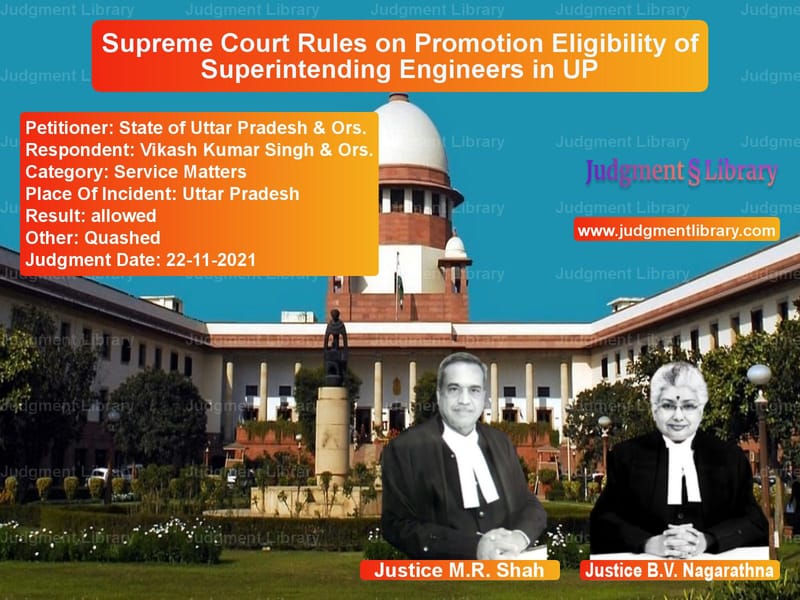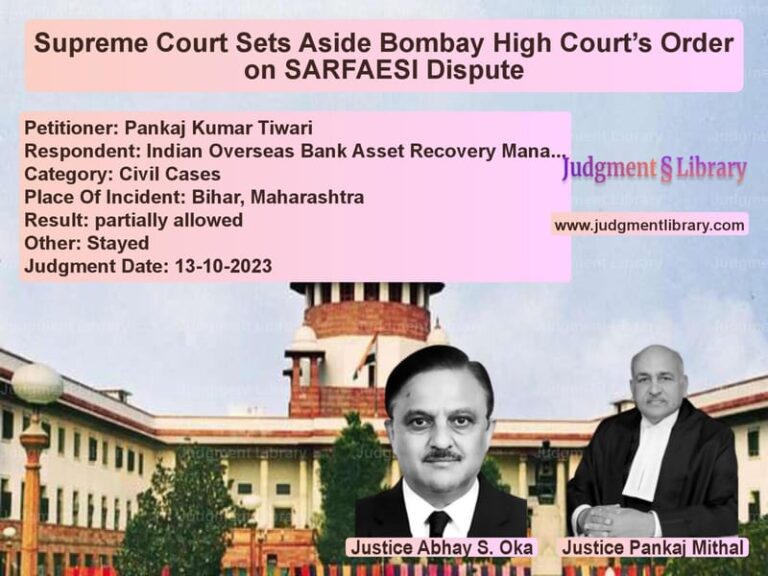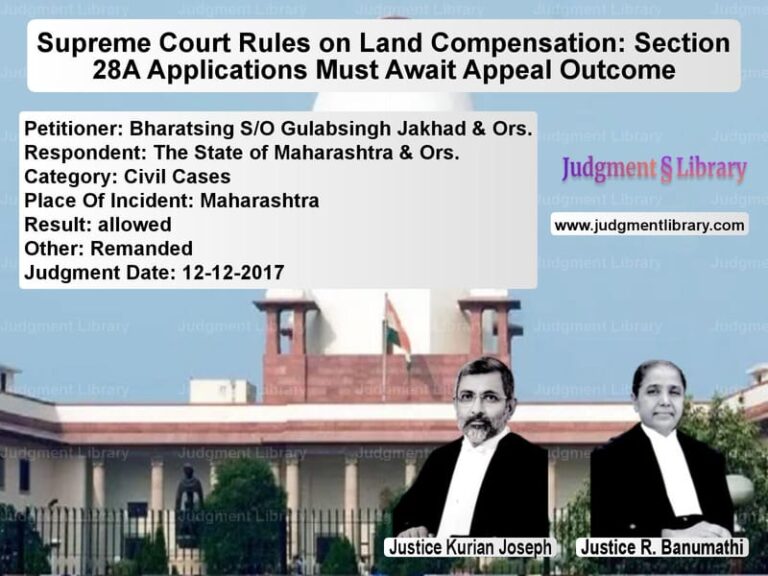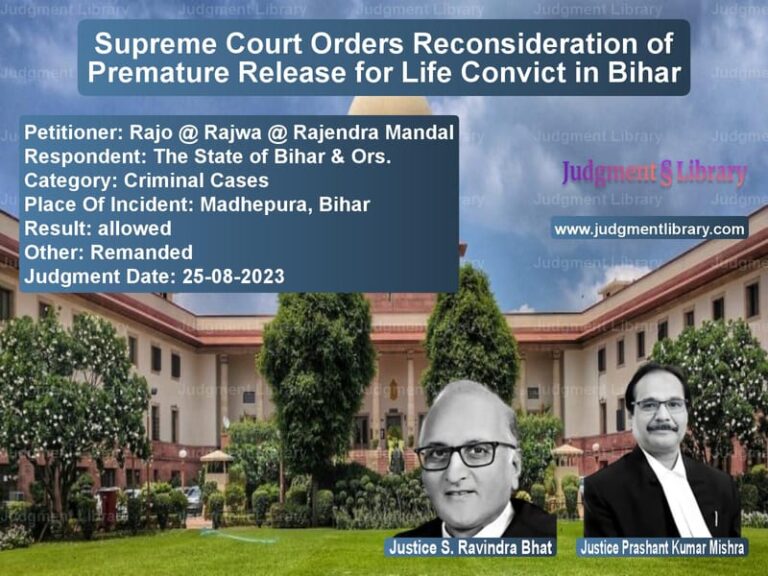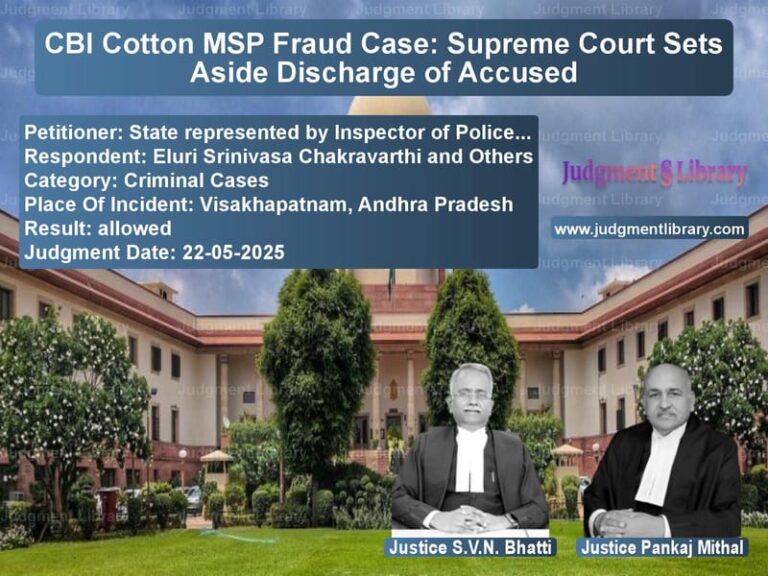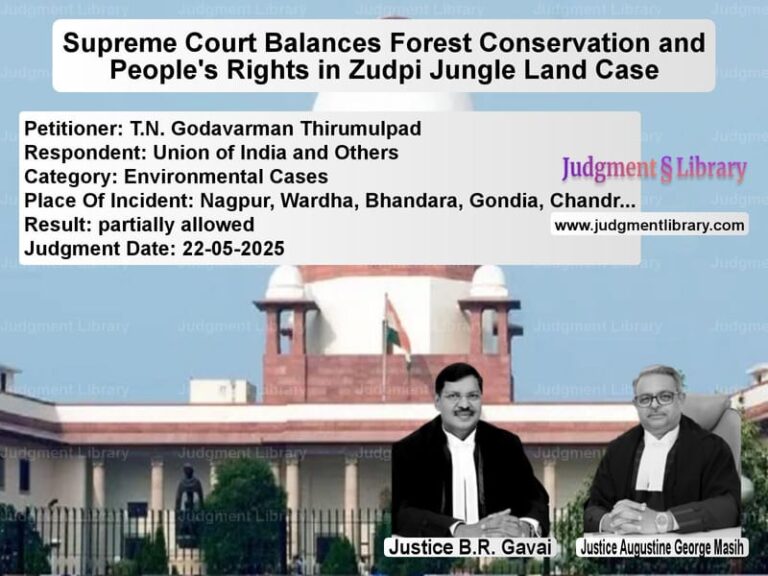Supreme Court Rules on Promotion Eligibility of Superintending Engineers in UP
The Supreme Court of India has delivered a significant judgment in the case of State of Uttar Pradesh & Ors. vs. Vikash Kumar Singh & Ors.. The case pertained to the eligibility of Superintending Engineers (Civil) for promotion to the post of Chief Engineer (Civil) Level-II in the Irrigation and Water Resources Department of Uttar Pradesh. The key issue revolved around the requirement of completing 25 years of service for promotion and whether relaxation in service length could be granted as a matter of right.
Background of the Case
The respondents, who were serving as Superintending Engineers in various locations, sought promotion to the post of Chief Engineer (Civil) Level-II. The recruitment for this post is governed by the U.P. Service of Engineers (Irrigation Department) (Group A) Service Rules, 1990. According to Rule 5(iii) of these rules, a candidate must have at least 25 years of service (including at least three years as a Superintending Engineer) to be eligible for promotion.
The dispute began when the State Government prepared eligibility lists in 2018 and 2019 for the promotion process. The original writ petitioners were excluded from these lists as they had not completed the required 25 years of service. The petitioners challenged this exclusion before the Allahabad High Court, arguing that they were entitled to relaxation under the U.P. Government Servants Relaxation in Qualifying Service for Promotion Rules, 2006 (Relaxation Rules, 2006).
High Court’s Ruling
The Single Judge of the High Court ruled in favor of the petitioners, directing the government to include their names in the eligibility list by granting them relaxation in service length under the Relaxation Rules, 2006. The Division Bench upheld this decision, following which the State of Uttar Pradesh appealed to the Supreme Court.
Petitioner’s Arguments (State of UP)
The State of Uttar Pradesh contended that:
- The eligibility requirement of 25 years of service is clearly mentioned in Rule 5(iii) of the Rules, 1990, and must be strictly followed.
- The exclusion of the petitioners from the eligibility list was in line with the statutory provisions.
- Granting relaxation under the Relaxation Rules, 2006 is a discretionary power and not a vested right of employees.
- The High Court erred in issuing a writ of mandamus, directing the government to grant relaxation in qualifying service.
Respondent’s Arguments (Superintending Engineers)
The respondents argued that:
- The government had previously granted relaxation in similar situations, and denying them the same was unfair.
- The Relaxation Rules, 2006 were introduced to prevent situations where deserving candidates were excluded due to minor service shortfalls.
- The government’s refusal to relax the service requirement was arbitrary and lacked justification.
Supreme Court’s Observations
1. Eligibility Criteria Must Be Strictly Followed
The Court ruled that the requirement of 25 years of service as per Rule 5(iii) is mandatory and must be adhered to. The Court observed:
“The eligibility criteria prescribed under the Rules, 1990 are statutory in nature and cannot be diluted unless explicitly provided for.”
2. Relaxation in Service is Discretionary
The Court emphasized that the provision for relaxation under the Relaxation Rules, 2006 does not create a mandatory obligation on the government to grant such relaxation. It noted:
“The word ‘MAY’ in Rule 4 of the Relaxation Rules, 2006 signifies that the competent authority has the discretion to grant or deny relaxation. No employee can claim it as a matter of right.”
3. High Court’s Error in Issuing Writ of Mandamus
The Supreme Court held that the High Court had exceeded its jurisdiction by directing the government to grant relaxation. It stated:
“The power to grant relaxation lies solely with the government. A writ of mandamus cannot be issued compelling the competent authority to exercise its discretion in a particular manner.”
4. Eligibility Lists Were Lawfully Prepared
The Court found that the eligibility lists prepared in 2018 and 2019 were in compliance with the Rules, 1990 and, therefore, valid:
“The exclusion of the respondents from the eligibility lists was based on their failure to meet the service requirement and was in strict compliance with the governing rules.”
Final Judgment
The Supreme Court ruled:
- The requirement of 25 years of service for promotion to Chief Engineer (Civil) Level-II is valid and binding.
- The Relaxation Rules, 2006 provide only a discretionary power to the government, and employees cannot claim relaxation as a right.
- The High Court’s order directing the government to grant relaxation and include the petitioners in the eligibility list is set aside.
- The eligibility lists prepared by the State Government are upheld.
Impact of the Judgment
The ruling has several implications for government employees and service regulations:
- Reinforces Strict Adherence to Eligibility Criteria: Employees must meet the required service length before being considered for promotions.
- Limits Judicial Intervention: Courts cannot compel the government to exercise discretionary powers in a particular manner.
- Clarifies Promotion Policies: Government departments must ensure transparency and fairness in preparing eligibility lists.
- Prevents Arbitrary Relaxation: The judgment ensures that relaxation in service requirements is granted only in exceptional cases.
Conclusion
The Supreme Court’s verdict in this case upholds the principles of administrative discretion and legal compliance in government service regulations. By reaffirming the mandatory nature of eligibility criteria and limiting judicial interference, the ruling provides clarity and consistency in promotion policies. It also sets a precedent for future cases concerning service rule relaxations, ensuring that such powers are exercised fairly and in accordance with established regulations.
Petitioner Name: State of Uttar Pradesh & Ors..Respondent Name: Vikash Kumar Singh & Ors..Judgment By: Justice M.R. Shah, Justice B.V. Nagarathna.Place Of Incident: Uttar Pradesh.Judgment Date: 22-11-2021.
Don’t miss out on the full details! Download the complete judgment in PDF format below and gain valuable insights instantly!
Download Judgment: state-of-uttar-prade-vs-vikash-kumar-singh-&-supreme-court-of-india-judgment-dated-22-11-2021.pdf
Directly Download Judgment: Directly download this Judgment
See all petitions in Promotion Cases
See all petitions in Employment Disputes
See all petitions in Public Sector Employees
See all petitions in Recruitment Policies
See all petitions in Judgment by Mukeshkumar Rasikbhai Shah
See all petitions in Judgment by B.V. Nagarathna
See all petitions in allowed
See all petitions in Quashed
See all petitions in supreme court of India judgments November 2021
See all petitions in 2021 judgments
See all posts in Service Matters Category
See all allowed petitions in Service Matters Category
See all Dismissed petitions in Service Matters Category
See all partially allowed petitions in Service Matters Category

